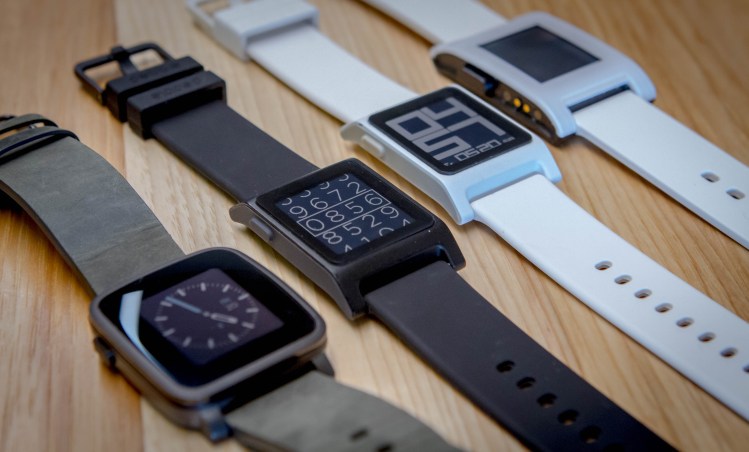Fitness wearable creator Fitbit is in the process of acquiring smartwatch maker Pebble in a deal that will likely spell the end of the Pebble brand. VentureBeat has learned that the sale price will be between $34 million and $40 million.
The deal, which was first reported by The Information, is not entirely surprising, as Pebble had been itching to sell itself and there had been indications of financial issues plaguing the company for some time. Should the deal go through within the anticipated price range, it would signal a drastic reversal of fortunes for Pebble, which burst onto the scene when it set a Kickstarter record of $7 million with its inaugural smartwatch. The Information said Fitbit will receive the company’s intellectual property and wearable expertise following closure of the deal, which could help it expand into other products.
Fitbit staged a successful public offering in June 2015, closing at $32.50, a 62.5 percent increase from its opening price on its first day of trading. However, seven months later, its stock tumbled below its IPO price of $20, and it closed today’s trading session at $8.36. The addition of Pebble looks like an effort to rejuvenate the company, but whether it will have a definitive impact is questionable — while Fitbit has been out commercializing its product and is appealing to the active community, the same cannot be said for Pebble, which has faced competition from the likes of Samsung and Apple.
Pebble was one of the first to launch in the smartwatch space, beating Apple by two years. It has raised more than $40 million through its Kickstarter campaigns, but that doesn’t seem to have helped the company establish financial footing. Earlier this year, it launched its third crowdfunding campaign, with its Pebble 2 and Pebble Time 2. The idea was to recreate the magic of its first effort, which brought in $10.2 million in 2012, and its second, for the original Pebble Time smartwatch, which netted $20.3 million.
AI Weekly
The must-read newsletter for AI and Big Data industry written by Khari Johnson, Kyle Wiggers, and Seth Colaner.
Included with VentureBeat Insider and VentureBeat VIP memberships.
But time has not been kind to the company, which was forced to lay off employees in March, when it parted ways with 25 percent (40 people) of its workforce. It has also lost several key executives, including head of product Itai Vonshak, head of human resources and legal counsel Jeff Hyman, and vice president of software engineering Kean Wong.
Pebble also had been the target of at least two potential acquisitions. Citizen was interested in purchasing the company for $740 million in the summer of 2015 but was rebuffed by Pebble chief executive Eric Migicovsky. He also blocked another potential deal, this time a $70 million purchase by Intel earlier this year that would have involved holding back the launch of the Pebble 2 and Pebble Time 2. The fact that the price tag has gone down substantially is telling.
In a twist, Vonshak and Wong are now both working at Intel.
Perhaps the biggest gain for Fitbit is Pebble’s operating system, which could enable the fitness tracker manufacturer to create an ecosystem of devices. The company is no stranger to smartwatches, as it has its own — called the Blaze — which launched in January. However, Pebble’s portfolio will likely diversify its lineup, which is what Fitbit’s chief executive James Park shared with analysts regarding his company’s future plans.
Should the deal go through, we’re told that the proceeds may go largely to cover Pebble’s debt, as much as $25 million of which is owed to Silicon Valley Bank. Investors in Pebble include Y Combinator, Draper Associates, CRV, ACE & Company, Tim Draper, and Mark Friedgan.
A Fitbit spokesperson declined to comment, and Pebble hasn’t responded to a request for comment.
VentureBeat's mission is to be a digital town square for technical decision-makers to gain knowledge about transformative enterprise technology and transact. Learn More
